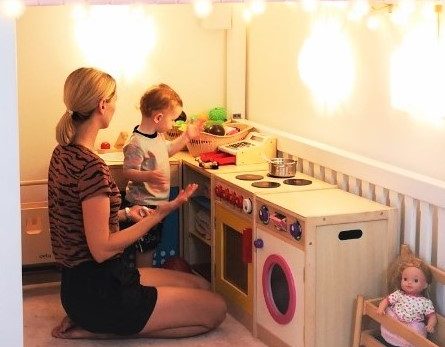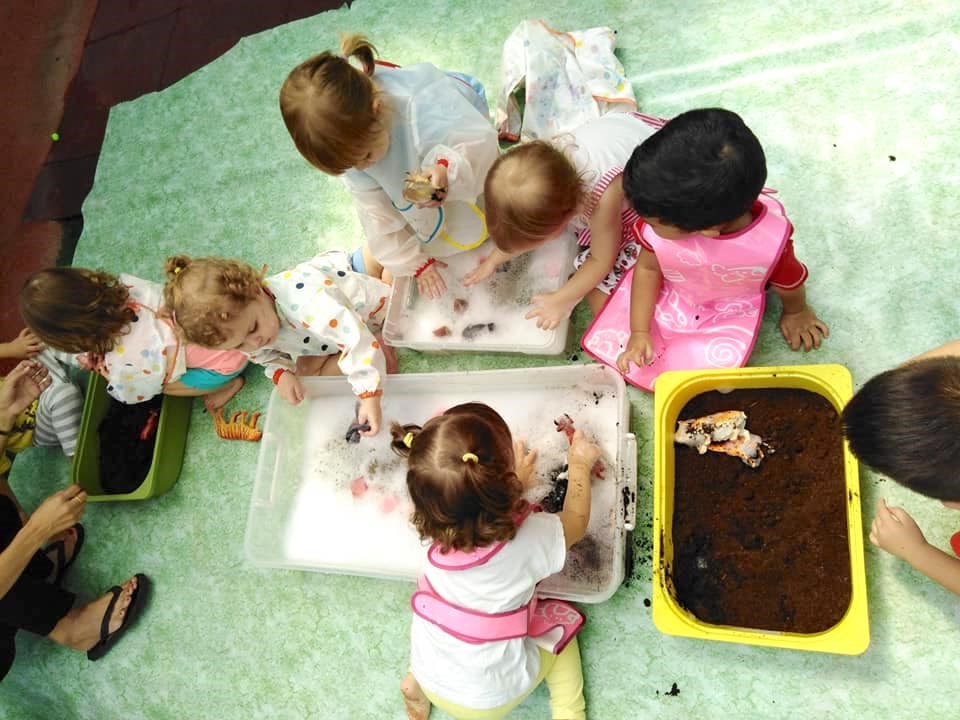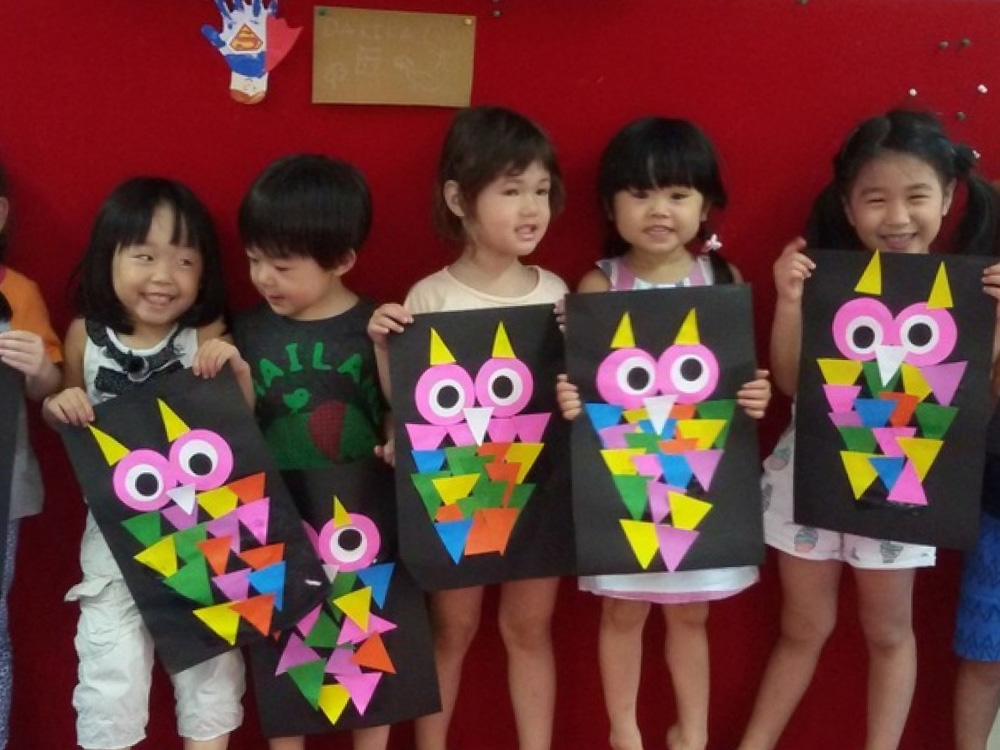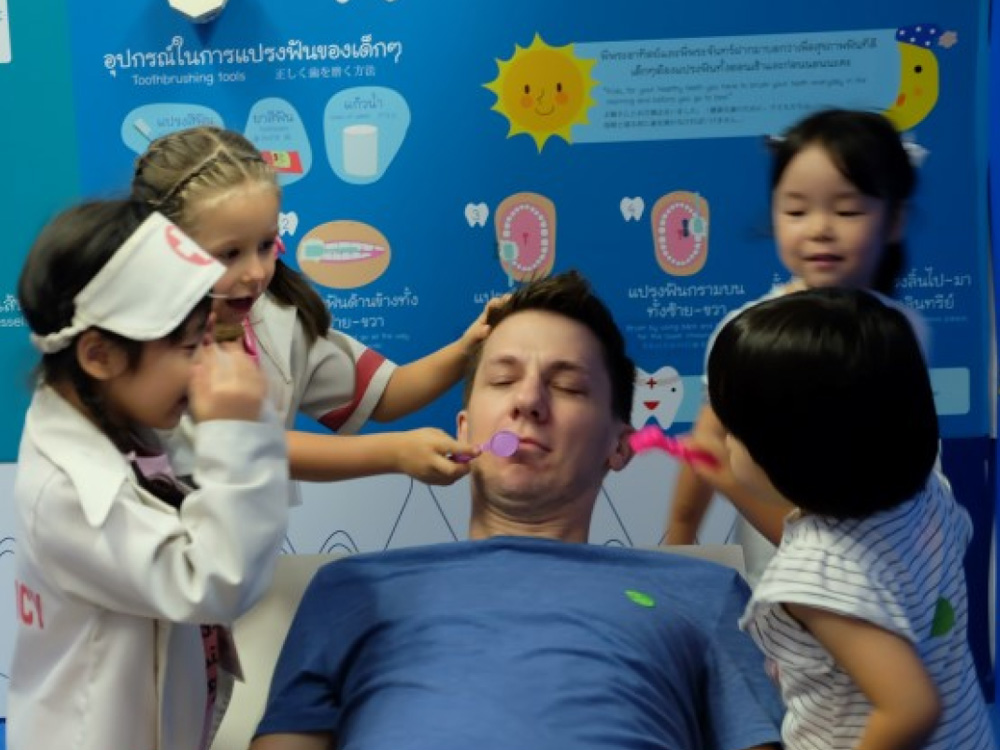Classes
Pre-Nursery
Toddlers Playgroup
Age Group: from 15+ months
School Hours: 9.15 – 11.15 AM
Schedule: Every Saturday (Apr – Aug 2021)
Discover and use self-help skills
Our program focuses on the following developmental areas: physical, emotional, social and cognitive. Our program will help children to discover and use self-help skills as they conduct the activities, with their parent, Children will be able to develop their independence skills as they explore their environment. The following are the areas that they will explore:
Creative Arts & Dramatic Play
Arts and craft projects / exposure to colors and different properties / role plays using props / singing, dancing and mimicking / dress up
Manipulative & Sensory Play
Sensory play activities / splash pool & water play / sand play / basic puzzles & block building
Books & Language Development
Singing and finger plays / stories / circle time / interaction with staff, parents and other children
Physical Development
Riding scooting toys / sand play & digging / running, jumping & climbing / various fine motor activities
Our program is designed to encourage a toddler’s innate curiosity. At this age your child will take major strides in social, emotional and physical development as they transition from toddlers to preschool experience. Toddlers are given the opportunity to work individually and in groups to promote socialization.
Our Indoor Playgroup area is equipped with age appropriate toys and books, dress-up and role play area, reading corner, art & craft center with easels, paints, glue, clay etc., soft gym and ball pool area, music and movements center. Our outdoor area is equipped with sand area, cars and cycling track, slides and swings, climbing frame and water play area.
Pre-Nursery
Age Group: 18+ months – 2 years
School Hours: 9.00 AM – 12:30 PM
Schedule: Monday to Friday
Discover and use self-help skills
Our program focuses on the following developmental areas: physical, emotional, social and cognitive. Our program will help children to discover and use self-help skills as they conduct the activities, with their parent, Children will be able to develop their independence skills as they explore their environment. The following are the areas that they will explore:
Dramatic / Role Play
Where children play with dressing up in costumes, assuming roles as characters, creating imaginary settings, and pretending to take on the roles of adults.
Manipulative Play
Where children enjoy puzzles, block building and lacing to enhance their fine motor skills.
Creative Play
Includes painting, coloring, cutting, gluing, scribbling using a variety of art tools. Art and craft activities help to boost a child’s self-esteem and self-regulation and also build on a child’s fine motor coordination.
Sensory Play
Where children use all their senses to discover and explore their environment, develop their imagination, creative thinking and ability to solve problem and experiment with solutions.
Physical Play
Where children use the whole body in activities with bikes, ball, jump ropes, hoops, sand play, etc. Teacher focus on improvement of skills in coordination, control, manipulation and movement.
Our philosophy is based on learning through play. “Play is how children begin to understand and process their world”, says Angie Rupan, Program Coordinator for Child Development Center in South San Francisco. Children’s play unlocks their creativity and imagination, and develops reading, thinking and problem-solving skills as well as further develops motor skills. It provides the base foundation for learning.
At Kids Kingdom, we believe that play is the foundation of all learning. Our teachers help children during play, providing them with opportunities and facilitating the process by setting up and organizing the right environment. Teachers acknowledge these experiences by articulating what they observe and letting the preschooler absorb these accomplishments again.
Nursery
Age: 2 – 3 years
Hours: 8.40 am – 12.30 (Half-day) / 8.40 – 2.30 pm (Full day)
Schedule: Monday to Friday

Language development
This is a time when their vocabulary is continually growing and the meaning and sentence structure of their language is becoming more complex. Preschoolers depend on language to make their wants and needs known, solve problems, ask questions and play with others. Teachers conduct activities to build on the children’s language skills through cooperative play. They create a variety of opportunities to enhance listening and speaking skills. Children are engaged in conversations through group discussions, storytelling and singing which helps build on the child’s early literacy skills and successful reading later in life. Through these varied and carefully planned activities, children get familiar with sounds, words, language and, eventually, the value and joy of books.”

Pre-number skills
Our math & manipulative area is designed to help the nursery children work logically, whether it be individual or in a group setting. Most concepts are learned while children go about their day engaged in play. They will make connections between new skills and what they already know. Children begin to count objects, sing number songs and match numbers to objects. They recognize basic shapes and primary colors and learn how to sort and classify objects based on colors. Children will also begin to compare objects based on their size, weight and height.

Social & emotional development
In preschool children will enter into the world filled with structured and informal learning; they will learn and practice social and emotional skills in the classroom and at play. Teachers will create opportunities to encourage the child’s social interactions and self-awareness.
Here are some of the developmental social-emotional milestones for our Nursery age group:
- Learn to have social contact with friends both one-on-one and in a group.
- Cooperate with peers; learning to share and take turns, building & maintaining friendships.
- Start to assert independence by preferring to try do things “by myself”, without help
- Understand how to manage their feelings and behaviors.
- Understand words and commands, and respond to them

Music & movements
Music & movements is incorporated into our early childhood education as it plays a big role in development, social interaction and language growth in young children. Playing music and moving to a beat provides fun and stimulating experiences for young children.

Thematic explorations / Science & understanding of the world
Exploring passion topics such as Dinosaurs, In the Garden, Outer Space, At the Zoo and Creepy Crawlies can be incredibly engaging for young children. By simply finding something they are interested in or checking on their prior knowledge of the topic, and setting up some learning experiences; children may be naturally drawn to explore and learn more.
For Science, children participate in a variety of hands-on science projects through which they are able to use their senses to learn more about their world. Children will be motivated to become naturally inquisitive about the world around them and teachers will help enhance their knowledge and thinking skills. Children will identify common animals and their features. They will demonstrate awareness of their own parts of the body. They will also begin to investigate objects and materials using their five senses.
Kindergarten (1-3)
Age: 3+ to 6 years
Hours: 8.40 am -12.30 or 2.30 pm
Schedule: Monday to Friday

Language development
From learning the sounds that make up words, to figuring out what the words mean and determining how to combine them into syntactic strings that have meaning within a culture or environment; mastering language use is a major achievement for such young children.
Children will be exposed to a variety of language experiences. Teachers will provide opportunities for them to express themselves freely and to participate in real life experiences that include reading and writing.
The following are the skills that children will have achieved by the end of Kindergarten:
Listening & Speaking Skills
In Kindergarten children begin to participate in collaborative conversations; they use strong commu- nication skills including verbal expression of emo- tions as well as descriptive language to express their ideas. They express curiosity and share their feelings and thoughts. They enjoy listening to stories and retelling them especially ones with interesting char- acters and easy-to-follow plots. They role play, create and make up songs and stories. They suc- cessfully follow multi-step instructions
Reading & Writing Skills
At this age children recognize the letters of the alphabet in written form and are able to connect sounds with the letters. They start to blend sounds into words. They try to read in everyday situations for example signs and labels etc. Children moving on to primary master more advanced phonics skills like forming CVC words, words with blends and long vowels to prepare them for reading & writing in their primary years.

Social & emotional development
In preparation for children to be ready for a wider education, there is a gradual shift from free play to a more structured learning. At this age, children are counting up and beyond 40; they understand the concepts of more than, less than, what comes next, which number is missing in a sequence, ordinal numbers and so on. For shapes, measurement and patterns, children are able to identify and draw 2D shapes, repeat a pattern, create a pattern, compare objects in regards to size, weight and volume. Spatial awareness and time are also important skills that children learn at this age. Children will begin to understand statistics & probability (likelihood or chance of an event happening) and data handling (collect and compare data of themselves and the environment)

Numeracy skills
In preparation for children to be ready for a wider education, there is a gradual shift from ‘free play’ to a more ‘structured learning’. At Kids Kingdom child-guided as well as adult-guided learning within a play-based environment are used to enhance children’s numeracy skills. At this age children are counting up and beyond 40; they understand the concepts of more than, less than, what comes next, which number is missing in a sequence, ordinal numbers and so on. For shapes, measurements & patterns; children are able to identify and draw 2-D shapes, repeat a pattern, create a pattern, compare objects in regards to size, weight, length and volume. Spatial awareness & time are also important skills that children learn at this age. Children also begin to understand statistics & probability (likelihood or chance of an event happening) and data handling (collect and compare data of themselves and the environment ).

Music & movements
Music & movements is incorporated into our early childhood education as it plays a big role in development, social interaction and language growth in young children. Playing music and moving to a beat provides fun and stimulating experiences for young children.

Thematic explorations
Children will participate in a variety of hands-on science projects related to the theme of the month; through which they are able to use their senses to learn more about their world. Children will be motivated to become naturally inquisitive about the world around them and teachers will help enhance their knowledge and thinking skills. Children will identify living and non-living things, classify different kinds of seeds, develop an awareness of dinosaurs and fossils, identify forces like push & pull and objects with magnetic properties and lots more!
Summer Camp
Age: 2 – 7 years
Hours: 8:40 am – 1:30 pm
Schedule: June – July
A perfect way to keep children intellectually and creatively stimulated during the break!!
- Get your Game on Sports
- On the Stage Performing Arts & Culinary Arts
- Experiments in Science
- Spy & Wilderness Explorers
- Football
- Basketball
- Obstacle Course
- Body Combat
- Hip Hop / Dance
….and lots more!
Kids Kingdom hosts exciting annual summer camps during the summer holiday which falls in the months of June-July. It is a perfect way to keep children intellectually and creatively stimulated during their holidays. We have interesting weekly themes where teachers keep the children engaged by incorporating many fun theme-related activities. Children are involved in activities in various areas such as science &nature, dramatic and creative play, arts & crafts, experimenting and discovering, language and numbers all while enhancing their social skills, physical activity level and most importantly having fun!









